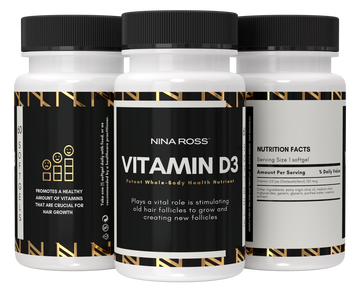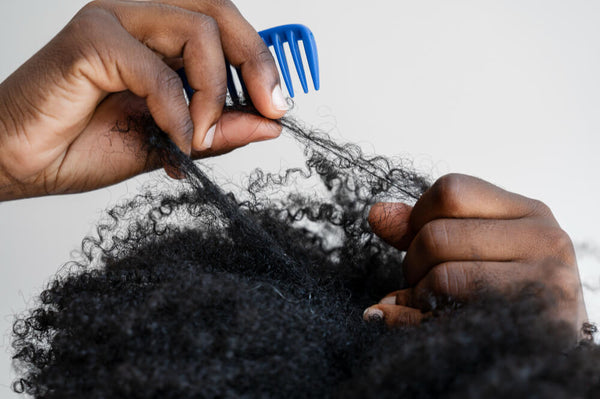Hair loss is a common problem. You might have noticed that some people lose their hair more than others, and that is because some people are more susceptible to it than others.
Regardless of your gender, there are certain factors that lead to hair loss. Among them, vitamin deficiency is the most common. But how can you tell if your hair loss may be due to a deficiency? Here's what you need to know about which vitamin deficiency causes hair loss:
Signs of vitamin deficiency hair loss
- Dry and brittle hair, especially the ends.
- Formation of male/female-pattern baldness.
- Thinning and splitting hair.
- Excessive (more than normal) hair fall.
- Noticeable scanty hair on the scalp (less volume).
Which vitamin deficiency causes hair loss?
Vitamin D3
Vitamin D3 aids in the absorption of magnesium phosphorus, and calcium. To maintain strong bones and teeth, these important minerals are required. Vitamin D3 also helps to maintain your immune system, which is important if you have psoriasis or another skin condition. Does vitamin D deficiency cause hair loss?
Vitamin D is essential for healthy hair development and can stop hair loss. Vitamin D deficiency has been connected to alopecia areata, a disorder that results in erratic hair loss.
Spend more time in the sunshine, eat foods high in vitamin D such as eggs, fatty fish, and enriched dairy products, or take vitamin D supplements to raise your levels (as directed by a medical professional). It is among the most essential vitamins for hair growth.

Vitamin A
The well-being of your eyes, skin, and hair depends on vitamin A. Carrots, sweet potatoes, and other vegetables are also rich in vitamin A. Also, milk and dairy products, eggs, and liver help in maintaining Vitamin A levels. Substantial levels of vitamin A are also present in cod liver oil.
If you're worried about your hair loss because you lack this essential nutrient in your diet (or if you simply want to avoid any risks associated with it), try adding more fruits or vegetables into your daily routine—especially if they are orange or red!

Vitamin B
Vitamin B aids in the normal functioning of your body. It promotes healthy nails, hair, and skin. Additionally, vitamin B helps regulate the nervous system, vision, and brain functioning.
Vitamin B plays an important role in maintaining healthy hearts by helping them pump more blood efficiently through arteries. They play a crucial role in oxygenating the scalp by producing red blood cells. This further helps the hair follicles in generating new hair growth.
Another benefit of Vitamin B for hair growth is that it aids in the production of fuller and thicker hair strands. Vitamin B7 or biotin is the most-preferred nutrient for hair and skin care.

Vitamin B12
Vitamin B12 is a water-soluble vitamin that helps to maintain the nervous system, red blood cells, and DNA. It’s also essential for nerve tissue repair and brain function. Because it’s so important to our overall health and well-being, it’s no surprise that vitamin B12 deficiency can cause hair loss.
Vitamin B12 is found in foods like beef liver; however, you may not get enough through diet alone if you don't eat these sources regularly or if your digestive system isn't working properly (like in cases of celiac disease).
If this is the case with you or someone else in your household—or if they have been diagnosed with an autoimmune disease such as Crohn's Disease—your doctor may recommend taking supplements containing natural forms of vitamin B12 instead of synthetic ones like cyanocobalamin which have been linked with heart problems when taken long term.

Calcium
Calcium is necessary for more than just healthy teeth and bones. Additionally, it supports the health of your nerves, blood vessels, and muscles.
Calcium deficiency can be caused by low levels of vitamin D or magnesium, which are needed to absorb calcium from food. Calcium-rich foods include dairy products such as milk, yogurt, and cheese; leafy green vegetables such as kale; fish (especially salmon); nuts like almonds or peanuts; legumes like beans which contain high amounts of plant-based protein and fiber.

Along with vitamin deficiencies, there are other factors and habits that are inadvertently causing you hair loss. These include-
- Hormonal imbalances
- Genetics and heredity
- Medical conditions
- Certain factors like- pregnancy, age, stress, etc.
- Poor lifestyle choices like sedentary life, improper diet, and poor sleep schedule.
- Wearing tight hairstyles (traction alopecia)
Takeaway:
You are in good shape if you get enough of these nutrients from food, but if you don’t, multi vitamins for hair loss will keep your body functioning at its best. But if there is to be a final verdict on which vitamin deficiency causes hair loss then there are two.
Vitamin D3 and calcium are two other key nutrients for hair health. The body can't make vitamin D3 on its own—it has to be obtained from the sun or from supplements like cod liver oil (which also contains omega-3 fatty acids).
In addition to helping regulate calcium levels in our bodies, vitamin D3 promotes healthy bones and teeth; it also helps prevent osteoporosis and cancer by regulating cell growth processes within the body.
Conclusion
The most important thing to remember is that hair loss is not permanent. While you may be experiencing some hair loss and are concerned about which vitamin deficiency causes hair loss, it’s important that you give yourself time to heal and get stronger before considering any drastic decisions.
Are you someone who is struggling with the emotions of losing hair? Then you need to watch this!
If you have any of these deficiencies of vitamins that cause hair loss, it is best to seek medical advice before making changes in your diet or lifestyle habits that could affect your health further down the road.
Have any questions? Book an appointment with Dr. Nina Ross, now!
















